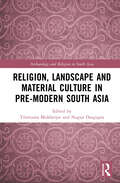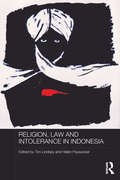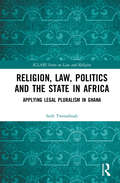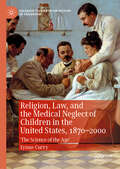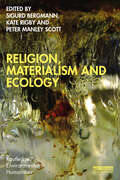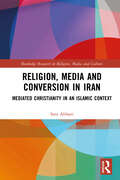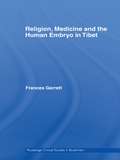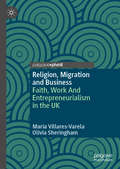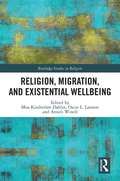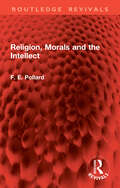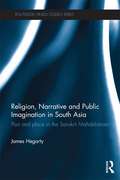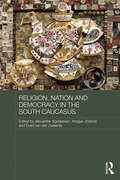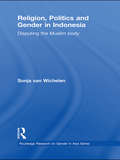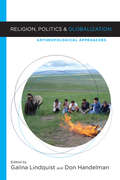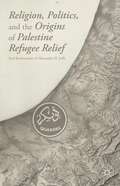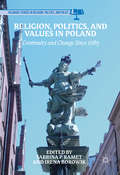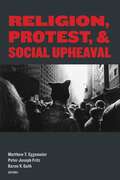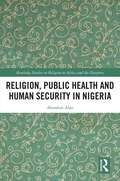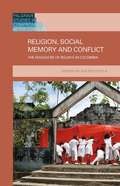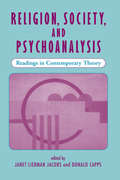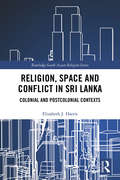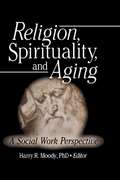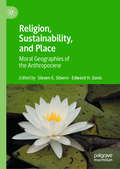- Table View
- List View
Religion, Landscape and Material Culture in Pre-modern South Asia (Archaeology and Religion in South Asia)
by Tilottama Mukherjee and Nupur DasguptaThis book highlights emerging trends and new themes in South Asian history. It covers issues broadly related to religion, materiality and nature from differing perspectives and methods to offer a kaleidoscopic view of Indian history until the late eighteenth century. The essays in the volume focus on understanding questions of premodern religion, material culture processes and their spatial and environmental contexts through a study of networks of commodities and cultural and religious landscapes. From the early history of coastal regions such as Gujarat and Bengal to material networks of political culture, from temples and their connection with maritime trade to the importance of landscape in influencing temple-building, from regions considered peripheral to mainstream historiography to the development of religious sects, this collection of articles maps the diverse networks and connections across regions and time. The volume will be of great interest to scholars and researchers of history, archaeology, museum and heritage studies, religion, especially Hinduism, Sufism and Buddhism, and South Asian studies.
Religion, Law and Intolerance in Indonesia (Routledge Law in Asia)
by Tim Lindsey Helen PausackerDespite its overwhelmingly Muslim majority, Indonesia has always been seen as exceptional for its diversity and pluralism. In recent years, however, there has been a rise in "majoritarianism", with resurgent Islamist groups pushing hard to impose conservative values on public life – in many cases with considerable success. This has sparked growing fears for the future of basic human rights, and, in particular, the rights of women and sexual and ethnic minority groups. There have, in fact, been more prosecutions of unorthodox religious groups since the fall of Soeharto in 1998 than there were under the three decades of his authoritarian rule. Some Indonesians even feel that the pluralism they thought was constitutionally guaranteed by the national ideology, the Pancasila, is now under threat. This book contains essays exploring these issues by prominent scholars, lawyers and activists from within Indonesia and beyond, offering detailed accounts of the political and legal implications of rising resurgent Islamism in Indonesia. Examining particular cases of intolerance and violence against minorities, it also provides an account of the responses offered by a weak state that now seems too often unwilling to intervene to protect vulnerable minorities against rising religious intolerance.
Religion, Law, Politics and the State in Africa: Applying Legal Pluralism in Ghana (ICLARS Series on Law and Religion)
by Seth TweneboahApplying a legal pluralist framework, this study examines the complex interrelationships between religion, law and politics in contemporary Ghana, a professedly secular State characterised by high levels of religiosity. It aims to explore legal, cultural and moral tensions created by overlapping loci of authority (state actors, traditional leaders and religious functionaries). It contends that religion can function as an impediment to Ghana’s secularity and also serve as an integral tool for realising the State’s legal ideals and meeting international human rights standards. Using three case studies – legal tensions, child witchcraft accusations and same-sex partnerships – the study illustrates the ways that the entangled and complicated connections between religion and law compound Ghana’s secular orientation. It suggests that legal pluralism is not a mere analytical framework for describing tensions, but ought to be seen as part of the solution. The study contributes to advancing knowledge in the area of the interrelationships between religion and law in contemporary African public domain. This book will be a valuable resource for those working in the areas of Law and Religion, Religious Studies, African Studies, Political Science, Legal Anthropology and Socio-legal Studies.
Religion, Law, and the Medical Neglect of Children in the United States, 1870–2000: 'The Science of the Age' (Palgrave Studies in the History of Childhood)
by Lynne CurryDrawing upon a diverse range of archival evidence, medical treatises, religious texts, public discourses, and legal documents, this book examines the rich historical context in which controversies surrounding the medical neglect of children erupted onto the American scene. It argues that several nineteenth-century developments collided to produce the first criminal prosecutions of parents who rejected medical attendance as a tenet of their religious faith. A view of children as distinct biological beings with particularized needs for physical care had engendered both the new medical practice field of pediatrics and a vigorous child welfare movement that forced legislatures and courts to reconsider public and private responsibility for ensuring children’s physical well-being. At the same time, a number of healing religions had emerged to challenge the growing authority of medical doctors and the appropriate role of the state in the realm of child welfare. The rapid proliferation of the new healing churches, and the mixed outcomes of parents’ criminal trials, reflected ongoing uneasiness about the increasing presence of science in American life.
Religion, Materialism and Ecology (Routledge Environmental Humanities)
by Sigurd Bergmann, Kate Rigby and Peter Manley ScottThis timely collection of essays by leading international scholars across religious studies and the environmental humanities advances a lively discussion on materialism in its many forms. While there is little agreement on what ‘materialism’ means, it is evident that there is a resurgence in thinking about matter in more animated and active ways. The volume explores how debates concerning the new materialisms impinge on religious traditions and the extent to which religions, with their material culture and beliefs in the Divine within the material, can make a creative contribution to debates about ecological materialisms. Spanning a broad range of themes, including politics, architecture, hermeneutics, literature and religion, the book brings together a series of discussions on materialism in the context of diverse methodologies and approaches. The volume investigates a range of issues including space and place, hierarchy and relationality, the relationship between nature and society, human and other agencies, and worldviews and cultural values. Drawing on literary and critical theory, and queer, philosophical, theological and social theoretical approaches, this ground-breaking book will make an important contribution to the environmental humanities. It will be a key read for postgraduate students, researchers and scholars in religious studies, cultural anthropology, literary studies, philosophy and environmental studies.
Religion, Media and Conversion in Iran: Mediated Christianity in an Islamic Context (Routledge Research in Religion, Media and Culture)
by Sara AfshariReligion, Media and Conversion in Iran studies the reception of Farsi Christian television channels by Muslim audiences in Iran: their motivations in viewing the Christian message, their methods of interpretation and negotiation with different media texts and their process of changing or altering their religion. Rooted in empirical research, it analyses three hundred narratives drawn from the audiences of four Farsi Christian satellite television channels between 2010 and 2015, investigating their conversion to Christianity through that medium. The research examines factors that influenced both their interpretations of, and negotiations with, the religious media message, and their process of changing, adding to or modifying their belief system, including their understanding of religious conversion. Drawing on Reception Theory, the book investigates the negotiations between meaning making and mediation and the process of faith transformation against the background of the sociology of religion and culture in contemporary Iran. By offering a unique insight into the way in which media and religion influence each other, this book is a great resource for any scholar of Religious Studies, Media Studies and Middle East Studies and will also be useful for religious media practitioners.
Religion, Medicine and the Human Embryo in Tibet (Routledge Critical Studies in Buddhism)
by Frances GarrettThis book explores the cultural history of embryology in Tibet, in culture, religion, art and literature, and what this reveals about its medicine and religion. Filling a significant gap in the literature this is the first in-depth exploration of Tibetan medical history in the English language. It reveals the prevalence of descriptions of the development of the human body – from conception to birth – found in all forms of Tibetan religious literature, as well as in medical texts and in art. By analysing stories of embryology, Frances Garrett explores questions of cultural transmission and adaptation: How did Tibetan writers adapt ideas inherited from India and China for their own purposes? What original views did they develop on the body, on gender, on creation, and on life itself? The transformations of embryological narratives over several centuries illuminate key turning points in Tibetan medical history, and its relationship with religious doctrine and practice. Embryology was a site for both religious and medical theorists to contemplate profound questions of being and becoming, where topics such as pharmacology and nosology were left to shape secular medicine. The author argues that, in terms of religion, stories of human development comment on embodiment, gender, socio-political hierarchy, religious ontology, and spiritual progress. Through the lens of embryology, this book examines how these concerns shift as Tibetan history moves through the formative 'renaissance' period of the twelfth through to the seventeenth centuries.
Religion, Migration and Business: Faith, Work And Entrepreneurialism in the UK (Religion and Global Migrations)
by Olivia Sheringham María Villares-VarelaThis book critically interrogates the role of religious faith in the experiences and practices of migrant entrepreneurs against the backdrop of neoliberal Britain. Focussing on Pentecostalism, a popular Christian denomination amongst migrant groups in the UK, the authors draw on primary qualitative data to examine the ways in which Pentecostal beliefs and values influence the aspirations and practices of migrant entrepreneurs. The book also explores the role of Pentecostal churches in supporting entrepreneurial activities among migrant communities, arguing that these institutions simultaneously comply and contest the formation of neoliberal subjectivities: providing cultural legitimacy to the entrepreneurial subject, whilst also contesting the community erosion of neoliberalism, (particularly in an austerity context) and fostering a strong a sense of belonging among congregants. The book offers an interdisciplinary perspective spanning sociology, geography and entrepreneurship studies to explain how values and faith networks shape everyday life, work and entrepreneurial practices.
Religion, Migration, and Existential Wellbeing: Theorizing the Role of Religion in Contemporary Migration and Integration Governance (Routledge Studies in Religion)
by Moa Kindström DahlinThis book uses the very latest research to examine current interactions between religion, migration and existential wellbeing. In particular, it demonstrates the role of religion and religious organizations in the social, medical and existential wellbeing of immigrants within their host societies. By focusing on the role and politics of religion and religious organisations as well as the religious identity and faith of individuals, it highlights the connection between existential wellbeing, integration and social cohesion. The book brings together researchers from various disciplines taking on the challenge to elaborate on the theme of this book from different perspectives, using different methods and theories with a wide selection of cases from various parts of the world. The value of multidisciplinary research on the role of religion in a globalised society – locally, nationally and internationally – is important for understanding the composition and potential solutions to social and political problems. Religious aspects and organisations are present in legal, political and social forms of governance and form the basis for future research on e.g. secularisation, democracy, minorities, human rights, welfare, healthcare and identity formation. These and other related topics are discussed in this book. This book is an up-to-date and multifaceted study of how religion engages with the mass movement of peoples. As such, it will be of great interest to any scholar of Religious Studies, Migrant Studies, Sociology of Religion, Religion and Politics, as well as Legal Studies with a human right focus.
Religion, Morals and the Intellect (Routledge Revivals)
by F. E. PollardOriginally published in 1932, and therefore inevitably of its time, this book discusses the place of the intellect as a guide to religious truth. The author's work brought principles from Quaker decision-making to bear on wider questions about democracy and religion. The author affirms that the ‘Light Within’, although a personal endowment is not independent of the historical fact that spiritual geniuses in bygone ages have seen and testified and lived.
Religion, Narrative and Public Imagination in South Asia: Past and Place in the Sanskrit Mahabharata (Routledge Hindu Studies Series)
by James HegartyThe Sanskrit Mahabharata is one of the greatest works of world literature and pivotal for the understanding of both Hindu traditions and wider society in ancient, medieval and modern South Asia. This book presents a new synthesis of philological, anthropological and cognitive-linguistic method and theory in relation to the study of narrative text by focusing on the form and function of the Mahabharata in the context of early South Asia. Arguing that the combination of structural and thematic features that have helped to establish the enduring cultural centrality of religious narrative in South Asia was first outlined in the text, the book highlights the Mahabharata’s complex orientation to the cosmic, social and textual past. The book shows the extent to which narrative is integral to human social life, and more generally the creation and maintenance of religious ideologies. It highlights the contexts of origin and transmission and the cultural function of the Mahabharata in first millennium South Asia and, by extension, in medieval and modern South Asiaby drawing on both textual and epigraphic sources. The book draws attention to what is culturally specific about the origination and transmission of early South Asian narrative and what can be used to enrich our orientation to narrative in human social life more globally.
Religion, Nation and Democracy in the South Caucasus (Routledge Contemporary Russia and Eastern Europe Series)
by Ansgar Jödicke Alexander Agadjanian Evert van der ZweerdeThis book explores developments in the three major societies of the South Caucasus – Armenia, Azerbaijan and Georgia – focusing especially on religion, historical traditions, national consciousness, and political culture, and on how these factors interact. It outlines how, despite close geographical interlacement, common historical memories and inherited structures, the three countries have deep differences; and it discusses how development in all three nations has differed significantly from the countries’ declared commitments to democratic orientation and European norms and values. The book also considers how external factors and international relations continue to impact on the three countries.
Religion, National Identity, and Confessional Politics in Lebanon
by Robert G. RabilTracing the rise of Islamism in Lebanon and its attempt to Islamize society and state by the reverse integration of society and state into the project of Islamism, this book looks at Lebanonagainst a background of weak and contestednational identity and capricious interaction between religious affiliation and confessional politics, and attempts to illustrate in detailed analysis this "comprehensive" project of Islamism according to its ideological and practical evolutionary change. The author demonstrates that, despite ideological, political and confessional incongruities and concerns, Islamism, in both its Sunni and Shi'a variants, has maintained a unity of purpose in pursuing its project: "Jihad" against Israel and abolishment of political sectarianism. "
Religion, Politics and Gender in Indonesia: Disputing the Muslim Body (Routledge Research on Gender in Asia Series)
by Sonja van WichelenThe political downfall of the Suharto administration in 1998 marked the end of the "New Order" in Indonesia, a period characterized by 32 years of authoritarian rule. It opened the way for democracy, but also for the proliferation of political Islam, which the New Order had discouraged or banned. Many of the issues raised by Muslim groups concerned matters pertaining to gender and the body. They triggered heated debates about women’s rights, female political participation, sexuality, pornography, veiling, and polygamy. The author argues that public debates on Islam and Gender in contemporary Indonesia only partially concern religion, and more often refer to shifting moral conceptions of the masculine and feminine body in its intersection with new class dynamics, national identity, and global consumerism. By approaching the contentious debates from a cultural sociological perspective, the book links the theoretical domains of body politics, the mediated public sphere, and citizenship. Placing the issue of gender and Islam in the context of Indonesia, the biggest Muslim-majority country in the world, this book is an important contribution to the existing literature on the topic. As such, it will be of great interest to scholars of anthropology, sociology, and gender studies.
Religion, Politics, And Globalization: Anthropological Approaches (Berghahn Ser.)
by Galina Don HandelmanWhile social scientists, beginning with Weber, envisioned a secularized world, religion today is forthrightly becoming a defining feature of life all around the globe. The complex connections between religion and politics, and the ways in which globalization shapes these processes, are central themes explored in this volume by leading scholars in the field of religion. Does the holism of numerous past and present day cosmologies mean that religions with their holistic orientations are integral to human existence? What happens when political ideologies and projects are framed as transcendental truths and justified by Divine authority? How are individual and collective identities shaped by religious rhetoric, and what are the consequences? Can mass murder, deemed terrorism, be understood as a form of ritual sacrifice, and if so, what are the implications for our sensibilities and practices as scholars and citizens? Using empirical material, from historical analyses of established religions to the everyday strife of marginalized groups such as migrants and dissident movements, this volume deepens the understanding of processes that shape the contemporary world.
Religion, Politics, And The Origins Of Palestine Refugee Relief
by Asaf Romirowsky Alexander H. JoffeThis book examines the leading role of the Quaker American Friends Service Committee in the United Nations relief program for Palestine Arab refugees in 1948-1950 in the Gaza Strip. Using archival data, oral histories, and biographical accounts, it provides a detailed look at internal decision-making in an early non-governmental organization.
Religion, Politics, and Values in Poland: Continuity and Change Since 1989 (Palgrave Studies in Religion, Politics, and Policy)
by Sabrina P. Ramet and Irena BorowikThis volume brings together leading scholars to examine how the Church has brought its values into the political sphere and, in the process, alienated some of the younger generation. Since the disintegration of the communist one-party state at the end of the 1980s, the Catholic Church has pushed its agenda to ban abortion, introduce religious instruction in the state schools, and protect Poland from secular influences emanating from the European Union. As one of the consequences, Polish society has become polarized along religious lines, with conservative forces such as Fr. Rydzyk’s Radio Maryja seeking to counter the influence of the European Union and liberals on the left trying to protect secular values. This volume casts a wide net in topics, with chapters on Pope John Paul II, Radio Maryja, religious education, the Church’s campaign against what it calls “genderism,” and the privatization of religious belief, among other topics.
Religion, Protest, and Social Upheaval
by Matthew T. Eggemeier, Peter Joseph Fritz, and Karen V. GuthRepresents some of the best, cutting-edge thinking available on multiple forms of social upheaval and related grassroots movements.From the January 2017 Women’s March to the August 2017 events in Charlottesville and the 2020 protests for racial justice in the wake of George Floyd’s murder, social upheaval and protest have loomed large in the United States in recent years. The varied, sometimes conflicting role of religious believers, communities, and institutions in such events and movements calls for scholarly analysis. Arising from a conference held at the College of the Holy Cross in November 2017, Religion, Protest, and Social Upheaval gathers contributions from ten scholars in religious studies, theology and ethics, and gender studies—from seasoned experts to emerging voices—to illuminate this tumultuous era of history and the complex landscape of social action for economic, racial, political, and sexual and gender justice.The contributors consider the history of resistance to racial capitalist imperialism from W. E. B. Du Bois to today; the theological genealogy of the capitalist economic order, and Catholic theology’s growing concern with climate change; affect theory and the rise of white nationalism, theological aesthetics, and solidarity with migrants; differing U.S. Christian churches’ responses to the “revolutionary aesthetics” of the Black Lives Matter movement; Muslim migration and the postsecular character of Muslim labor organizing in the United States; shifts in moral reasoning and religiosity among U.S. women’s movements from the 1960s to today; and the intersection of heresy discourse and struggles for LGBTQ+ equality among Korean and Korean-American Protestants. With this pluralistic approach, Religion, Protest, and Social Upheaval offers a snapshot of scholarly religious responses to the crises and promises of the late 2010s and early 2020s. Representing the diverse coalitions of the religious left, it provides groundbreaking analysis, charts trajectories for further study and action, and offers visions for a more hopeful future.
Religion, Public Health and Human Security in Nigeria (Routledge Studies on Remote Places and Remoteness)
by Abiodun AlaoThis book critically examines the intersection of religion, public health and human security in Nigeria. Focusing on Christianity, Islam, traditional religions and "intra-religious" doctrinal divergencies, the book explores the impact faith has on health-related decisions and how this affects security in Nigeria. The book assesses the connection between religion and five contemporary major health and medical issues in the country. This includes the issue of epidemics and pandemics such as the Covid-19 pandemic, vaccines, contraception, blood transfusion and the controversies associated with "miracle healing". In particular, the book explores situations where individuals have the power of choice but instead, embraces faith and religious positions that contradict science in the management of their health and, in the process, expose themselves and others to personal health insecurity. It investigates aspects of human security including the wider international ramifications of health issues, approaches to cures and the interpretation of causes of diseases, as well as the ethno-religious connotations of such interpretations. Exploring key issues that have brought religion into the politics of health and human security in Nigeria, this book will be of interest to students and scholars in the field of African Religion, African Politics, African Studies, public health, security, and Sociology.
Religion, Race, and the Making of Confederate Kentucky, 1830-1880
by Luke E. HarlowThis book sheds new light on the role of religion in the nineteenth-century slavery debates. In it, Luke E. Harlow argues that ongoing conflict over the meaning of Christian "orthodoxy" constrained the political and cultural horizons available for defenders and opponents of American slavery. The central locus of these debates was Kentucky, a border slave state with a long-standing antislavery presence. Although white Kentuckians famously cast themselves as moderates in the period and remained with the Union during the Civil War, their religious values showed no moderation on the slavery question. When the war ultimately brought emancipation, white Kentuckians found themselves in lockstep with the rest of the Confederate South. Racist religion thus paved the way for the making of Kentucky's Confederate memory of the war, as well as a deeply entrenched white Democratic Party in the state.
Religion, Social Memory and Conflict
by Sandra Milena Rios OyolaThe field of transitional justice and reconciliation considers social memory to be an important mechanism for acknowledging the violation of victims' rights and a step toward building peace. Societies in conflict, such as Colombia, challenge our current understanding of using memory in the construction of social peace processes, which in turn question the impossibility of forgiving violence that is still to come. Drawing on original ethnographical research, Rios analyses strategies of memorialization after the massacre of Bojay#65533;, Colombia, as an arena of political contention but also of grassroots resistance to persistent and diverse forms of violence. The book focuses on the work of the local grassroots Catholic Church and of the victims' association ten years after the massacre of Bojay#65533;. It explores the role of religion in the management of victims' emotions and in supporting claims of transitional justice from a grassroots perspective in a context of thin political transition.
Religion, Society, And Psychoanalysis: Readings In Contemporary Theory
by Janet L JacobsDistinguished contributors provide an overview of three generations of psychoanalytic theory, including the work of Freud, Horney, Winnicott, and Kristeva, and discuss the evolution of psychoanalytic thought as it relates to the role that religion plays in modern culture. }Religion clearly remains a powerful social and political force in Western society. Freudian-based theory continues to inform psychoanalytic investigations into personality development, gender relations, and traumatic disorders. Using a historical framework, this collection of new essays brings together contemporary scholarship on religion and psychoanalysis. These various yet related psychoanalytic interpretations of religious symbolism and commitment offer a unique social analysis on the meaning of religion.Beginning with Freuds views on religion and mystical experience and continuing with those of Horney, Winnicott, Kristeva, Miller, and others, this volume surveys the work of three generations of psychoanalytic theorists. Special attention is given to objects relations theory and ego psychology, as well as to the recent work from the European tradition. Distinguished contributors provide a basic overview of a given theorists scholarship and discuss its place in the evolution of psychoanalytic thought as it relates to the role that religion plays in modern culture. Religion, Society, and Psychoanalysis marks a major, interdisciplinary step forward in filling the void in the social-psychology of religion. It is an extremely useful handbook for students and scholars of psychology and religion.
Religion, Space and Conflict in Sri Lanka: Colonial and Postcolonial Contexts (Routledge South Asian Religion Series)
by Elizabeth J. HarrisSpace is dynamic, political and a cause of conflict. It bears the weight of human dreams and fears. Conflict is caused not only by spatial exclusivism but also by an inclusivism that seeks harmony through subordinating the particularity of the Other to the world view of the majority. This book uses the lens of space to examine inter-religious and inter-communal conflict in colonial and post-colonial Sri Lanka, demonstrating that the colonial can shed light on the post-colonial, particularly on post-war developments, post-May 2009, when Buddhist symbolism was controversially developed in the former, largely non-Buddhist, war zones. Using the concepts of exclusivism and inclusivist subordination, the book analyses the different imaginaries or world views that were present in colonial and post-1948 Sri Lanka, with particular reference to the ethnic or religious Other, and how these were expressed in space, influenced one another and engendered conflict. The book’s use of insights from human geography, peace studies and secular iterations of the theology of religions breaks new ground, as does its narrative technique, which prioritizes voices from the nineteenth and twentieth centuries, and the author’s fieldwork and personal observation in the twenty first. Through utilizing past and contemporary reflections on lived experience, informed by diverse religious world views, the book offers new insights into Sri Lanka’s past and present. It will be of interest to an interdisciplinary audience in the fields of colonial and postcolonial studies; war and peace studies; security studies; religious studies; the study of religion; Buddhist Studies, mission studies, South Asian and Sri Lankan studies.
Religion, Spirituality, and Aging: A Social Work Perspective
by Harry R MoodyLearn how to make a more positive impact with your social work with the agedReligion is an important coping mechanism for many aging adults. Religion, Spirituality, and Aging: A Social Work Perspective presents the latest research that shows how religion and spirituality can improve quality of life for elders. Respected social work researchers and scholars provide insight and practical methods for fostering positive aging while also considering how spirituality and religion can affect practitioners themselves. The full range of advantages and ethical implications are discussed in clear detail from a social work viewpoint. Case studies plainly illustrate the positive impact that the inclusion of spirituality and religion in an aging person&’s life may have on their physical and mental welfare.Organized social work in the early twentieth century actively tried to distance itself from its roots as a form of religious charity in favor of becoming a scientific and professional endeavor. Religion, Spirituality, and Aging once again bridges the gap between social work and spiritual matters by presenting penetrating articles that discusses the issues of the aging soul while examining ways to improve care. Creative strategies are offered to contribute to the spiritual side of aging while considering every implication and ethical question. The compilation is extensively referenced and includes helpful figures and tables to clearly illustrate data and ideas.Religion, Spirituality, and Aging discusses: the latest social work trends and attitudes toward spirituality prayer, meditation, and acts of altruism as interventions an empirical study of how social workers use religion and spirituality as an intervention ethical considerations and best practices religion and spirituality during long-term care the "Postcards to God" project dreams and their relationship to the search for meaning in later life a spiritual approach to positive aging through autobiography dementia and spirituality creating new rituals for sacred aging spiritual master Henri Nouwen&’s principles of aging-and his approaches to caring for older people an interview study on elders&’ spirituality and the changes manifested in their views of religionReligion, Spirituality, and Aging is a remarkable reminder that elders are our future selves. This erudite, well-reasoned examination of aging and spirituality from a social work perspective is crucial reading for social workers, human service professionals who work with the aged, and gerontology scholars.
Religion, Sustainability, and Place: Moral Geographies of the Anthropocene
by Steven E. Silvern Edward H. DavisThis book explores how religious groups work to create sustainable relationships between people, places and environments. This interdisciplinary volume deepens our understanding of this relationship, revealing that the geographical imagination—our sense of place—is a key aspect of the sustainability ideas and practices of religious groups. The book begins with a broad examination of how place shapes faith-based ideas about sustainability, with examples drawn from indigenous Hawaiians and the sacred texts of Judaism and Islam. Empirical case studies from North America, Europe, Central Asia and Africa follow, illustrating how a local, bounded, and sacred sense of place informs religious-based efforts to protect people and natural resources from threatening economic and political forces. Other contributors demonstrate that a cosmopolitan geographical imagination, viewing place as extending from the local to the global, shapes the struggles of Christian, Jewish and interfaith groups to promote just and sustainable food systems and battle the climate crisis.
